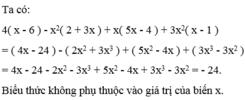Hãy nhập câu hỏi của bạn vào đây, nếu là tài khoản VIP, bạn sẽ được ưu tiên trả lời.

a) 5x(12x + 7) - 3x(20x - 5) = -100
<=> 60x2 + 35x - 60x2 + 15x = -100
<=> 50x = -100
<=> x = -2
b) 0,6x(x - 0,5) - 0,3x(2x + 1,3) = 0,138
<=> 0,6x2 - 0,3x - 0,6x2 - 0,39x = 0,138
<=> -0,69x = 0,138
<=> x = -0,2
c) 4x(3x - 7) - 6(2x2 - 5x + 1) = 12
<=> 12x2 - 28x - 12x2 + 30x - 6 = 12
<=> 2x - 6 = 12
<=> 2x = 18
<=> x = 9

a. 5x.(12x + 7) - 3x(20x - 5) = - 100
↔ 60x2 + 35x - 60x2 + 15x = - 100
↔ 50x = - 100
→ x = - 2
b. 0,6x(x - 0,5) - 0,3x(2x + 1,3) = 0,138
↔ 0,6x2 - 0,3x - 0,6x2 - 0,39x = 0,138
↔ - 0,6x = 0,138
↔ x = 0,138 : (- 0,6)
↔ x = - 0,2

a) \(5x\left(12x+7\right)-3x\left(20x-5\right)=-100\\ \Leftrightarrow60x^2+35x-60x^2+15x=-100\Leftrightarrow50x=-100\Leftrightarrow x=-2\)
b) câu này nó cứ lộn lộn kiểu gì ý:vvvvô tình muốn giúp nhưng đíu bt đúng hay sai:vv
\(6x\left(x-0,5\right)-0.3x\left(2x+1.3\right)=0,138\\ \Leftrightarrow6x^2-3x-0,6x^2-0,39x=0,138\Leftrightarrow5,4x^2-3,39x=0,138\)
tới này thôi:vvv

Chứng tỏ rằng các đa thức sau ko phụ thuộc vào biến
a) Ta có: \(A=\left(3x-5\right)\left(2x+11\right)-\left(2x+3\right)\left(3x+7\right)\)
\(=6x^2+33x-10x-55-\left(6x^2+14x+9x+21\right)\)
\(=6x^2+23x-55-6x^2-23x-21\)
=-74
Vậy: Đa thức A không phụ thuộc vào biến(đpcm)
b) Ta có: \(B=\left(x-5\right)\left(2x+3\right)-2x\left(x-3\right)+x+7\)
\(=2x^2+3x-10x-15-2x^2+6x+x+7\)
\(=-8\)
Vậy: Đa thức B không phụ thuộc vào biến(đpcm)
c) Ta có: \(C=4\left(x-6\right)-x^2\left(2+3x\right)+x\left(5x-4\right)+3x^2\left(x-1\right)\)
\(=4x-24-2x^2-3x^3+5x^2-4x+3x^3-3x^2\)
\(=-24\)
Vậy: Đa thức C không phụ thuộc vào biến(đpcm)
d) Ta có: \(D=x\left(y+z-yz\right)-y\left(z+x-zx\right)+z\left(y-x\right)\)
\(=xy+xz-xyz-yz-xy+xyz+zy-zx\)
=0
Vậy: Đa thức D không phụ thuộc vào biến(đpcm)

\(\left(1-x\right)\left(5x+3\right)=\left(3x-7\right)\left(x-1\right)\)
\(< =>\left(1-x\right)\left(5x+3+3x-7\right)=0\)
\(< =>\left(1-x\right)\left(8x-4\right)=0\)
\(< =>\orbr{\begin{cases}1-x=0\\8x-4=0\end{cases}< =>\orbr{\begin{cases}x=1\\x=\frac{1}{2}\end{cases}}}\)
\(\left(x-2\right)\left(x+1\right)=x^2-4\)
\(< =>\left(x-2\right)\left(x+1\right)=\left(x-2\right)\left(x+2\right)\)
\(< =>\left(x-2\right)\left(x+1-x-2\right)=0\)
\(< =>-1\left(x-2\right)=0\)
\(< =>2-x=0< =>x=2\)

1)
a) \(x\left(2x+1\right)-x^2\left(x+2\right)+\left(x^3-x+3\right)\)
\(=2x^2+x-x^3-2x^2+x^3-x+3=3\)
=>đpcm
b) \(4\left(x-6\right)-x^2\left(2+3x\right)+x\left(5x-4\right)+3x^2\left(x-1\right)\)
\(=4x-24-2x^2-3x^3+5x^2-4x+3x^3-3x^2=-24\)
=>đpcm
2,
a) \(5x\left(12x+7\right)-3x\left(20x-5\right)=-100\)
\(\Leftrightarrow60x^2+35x-60x^2+15x=-100\)
\(\Leftrightarrow50x=-100\)
\(\Leftrightarrow x=-2\)
b) \(0,6x\left(x-0,5\right)-0,3x\left(2x+1,3\right)=0,138\)
\(\Leftrightarrow0,6x^2-0,3x-0,6x^2-0,39x=0,138\)
\(\Leftrightarrow-0,69x=0,138\)
\(\Leftrightarrow x=-0,2\)
Câu 1:
a)\(x\left(2x+1\right)-x^2\left(x+2\right)+\left(x^2-x+3\right)\)
\(=2x^2+x-x^3-2x^2+x^2-x+3\)
\(=x^3+3\)(ko thể CM)
b)\(4\left(x-6\right)-x^2\left(2+3x\right)+x\left(5x-4\right)+3x^2\left(x-1\right)\)
\(=4x-24-2x^2-3x^3+5x^2-4x+3x^3-3x^2\)
\(=-24\)(đpcm)